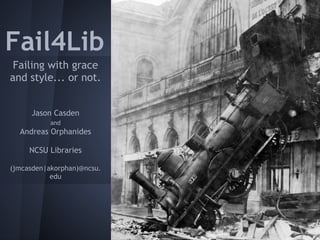Fail4Lib
- 1. Fail4Lib Failing with grace and style... or not. Jason Casden and Andreas Orphanides NCSU Libraries (jmcasden|akorphan)@ncsu. edu
- 2. Outline 1. Identifying and managing failure 2. Failure anxiety! 3. Talking about failure 4. Lightning talks
- 3. Outcomes 1. I like to think about wrongness and failure a. Can we talk about it in a productive way? b. Can we improve the ways we handle, seek, or discuss failure? 2. Is this kind of workshop useful? a. There will be a survey.
- 4. Part 1: Identifying & managing failure
- 5. Readings 1) The Long, Dismal History of Software Project Failure (Coding Horror) http://www.codinghorror.com/blog/2006/05/the-long-dismal-history-of- software-project-failure.html 2) Sowing Failure, Reaping Success (New York Times) http://learning.blogs.nytimes.com/2012/05/07/sowing-failure-reaping- success-what-failure-can-teach/ 3) On Being Wrong (Kathryn Schulz via TED) http://www.ted.com/talks/kathryn_schulz_on_being_wrong.html
- 7. Some flavors of failure â Technical failure â Failure to effectively address a real user need â Overinvestment â Outreach/Promotion failure â Design/UX failure â Project team communication failure â Missed opportunities (risk-averse failure) (!) â Failure to launch
- 17. Hosted by Nina McHale and Chris Evjy, featuring Monique Sendze, Jason Battles, Rachel Vacek, and Steve Teeri.
- 18. Access 2011
- 19. Biz Lit buzz â Lean startup principles â Failing fast â Pivots â Beginner's mind â Wrongology
- 20. Managing risk â Building diverse teams â Expecting dead ends â Having fall-back plans â Fault-tolerant schedules â Establishing flexible goals at the start
- 21. Getting myself beat up Avoiding Schulz's assumptions 1) Ignorance assumption 2) Idiocy assumption 3) The evil assumption
- 22. Breakout 1: Understanding and dealing with failure in your own practice â What are the symptoms of failure? â How do you identify an incipient failure and try to recover/adjust? â What do you do after a project has failed? How do you make failure valuable? (Post-mortems, recovery, etc....) â How do you plan for the unknown when beginning a project? â How do you manage risk to mitigate potential damage when undertaking work in new areas?
- 23. Part 2: Failure anxiety!
- 24. Readings 1) Mitt Romney learns the hard way: mission critical systems are called that for a reason (Ars Technica) http://arstechnica.com/information-technology/2012/11/inside-team-romneys-whale-of-an-it- meltdown/ 2) The Therac-25 disaster: the dangers of a ânothing will go wrongâ mentality Short version (CalPoly software engineering): http://users.csc.calpoly. edu/~jdalbey/SWE/Papers/THERAC25.html Full report (Nancy Levison, PI of the Therac-25 investigation) -- Optional, but a fascinating read: http://sunnyday.mit.edu/papers/therac.pdf 3) How risk averse is too risk averse? Bruce Schneier on "Cover Your Ass" security policy (Wired) http://www.wired.com/politics/security/commentary/securitymatters/2007/02/72774? currentPage=all
- 25. 1: ORCA and contextual testing â Testing dimensions for realtime services â Communications strategy, training, etc â Resource deployment â Security, trust, timing, identity mgmt â Helpdesk support â Common-sense documentation management
- 26. 2: THERAC-25 & software control â Risk management and risk severity â High-risk software dev anti-practices â Inherited software, new hardware â Poor code design and management â Redundant hardware checks? â Test environment / reality mismatch â Limits and risks of software control â Opaque error reporting â Denial
- 27. 3: TSA CYA â Hindsight-based security practices â Relative risk versus perceived risk â "Just in case" thinking â Visible but ineffective "security theater" â What drives risk management decisions?
- 28. Breakout 2: Where's the sweet spot? â How could these problems have been avoided, or their damage mitigated? â How can we manage the need for assigning blame? How do we focus on moving forward after a failure? Are there cases where finding a responsible party is warranted? â What liabilities are associated with too great a focus on blame/responsibility? What liabilities are associated with setting aside the assignment of responsibility? â What are the worst case scenarios for your own work? How does this affect your risk management choices?
- 29. Part 3: Talking about failure
- 30. Readings 1) James Dyson on living a life of failure (37 Signals) http://37signals.com/svn/posts/408-james-dyson-on-living-a-life-of-failure 2) Quantity always trumps quality (Coding Horror) http://www.codinghorror.com/blog/2008/08/quantity-always-trumps- quality.html 3) Blameless PostMortems and a Just Culture (Etsy: Code as Craft) http://codeascraft.etsy.com/2012/05/22/blameless-postmortems/
- 31. Balancing credibility and flexibility Certainty is a limited resource early on This isn't an excuse for poor planning or communication
- 32. Iteration
- 33. "Pivots"
- 34. Breakout 3: Surviving failure, risk, and the unexpected with grace. â How do you prepare colleagues for unexpected outcomes? â What is your organizationâs approach to risk and failure? â Is risk well-tolerated/well-managed? â What are the consequences of a failed project? â Is failure seen as an endpoint -- a negative outcome to an endeavor -- or merely a step in the development process? â How do you talk about âfailureâ with your colleagues? Supervisors? Stakeholders? Patrons? Reports? What kind of language do you use?
- 35. Lightning talks!




































